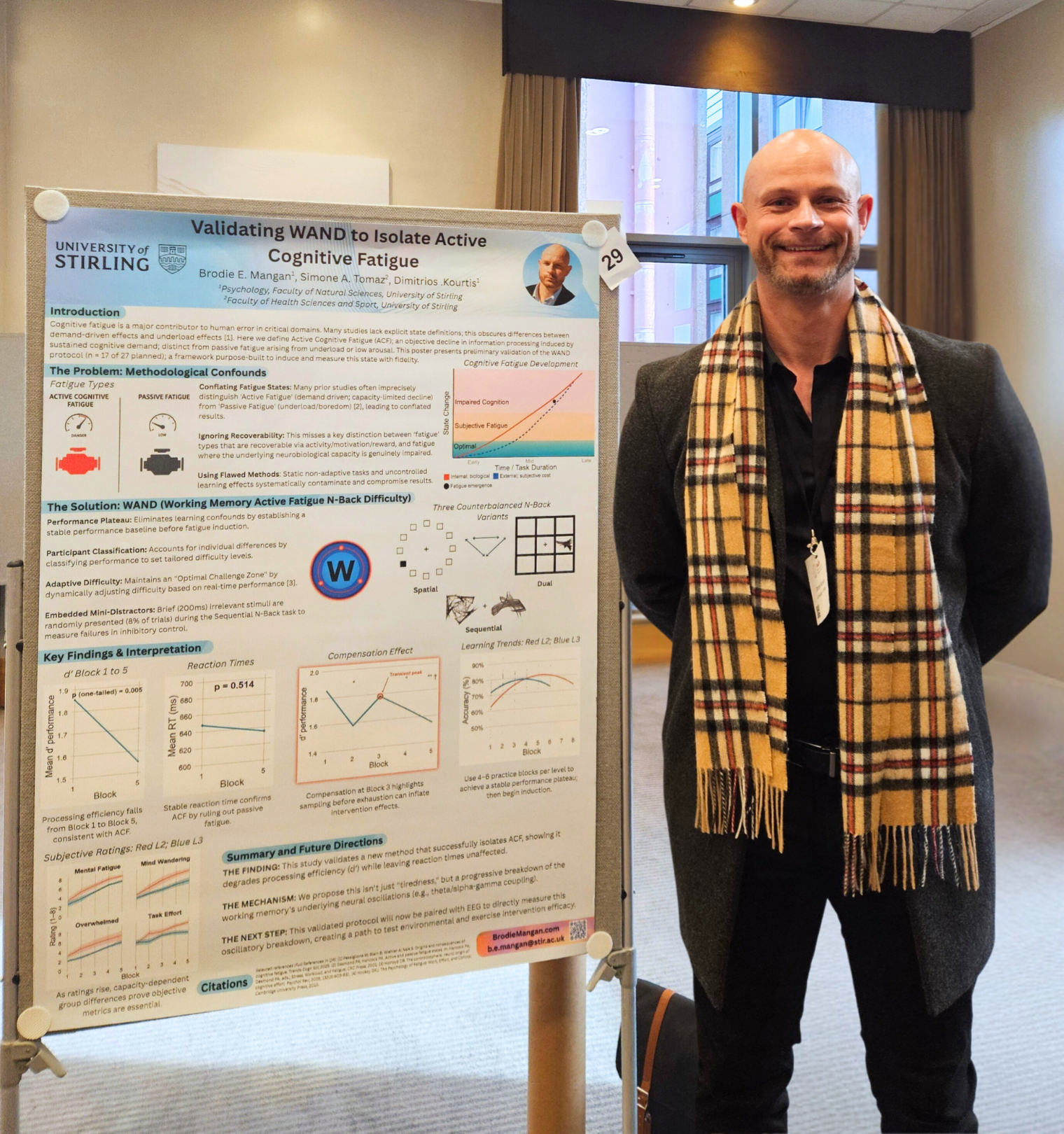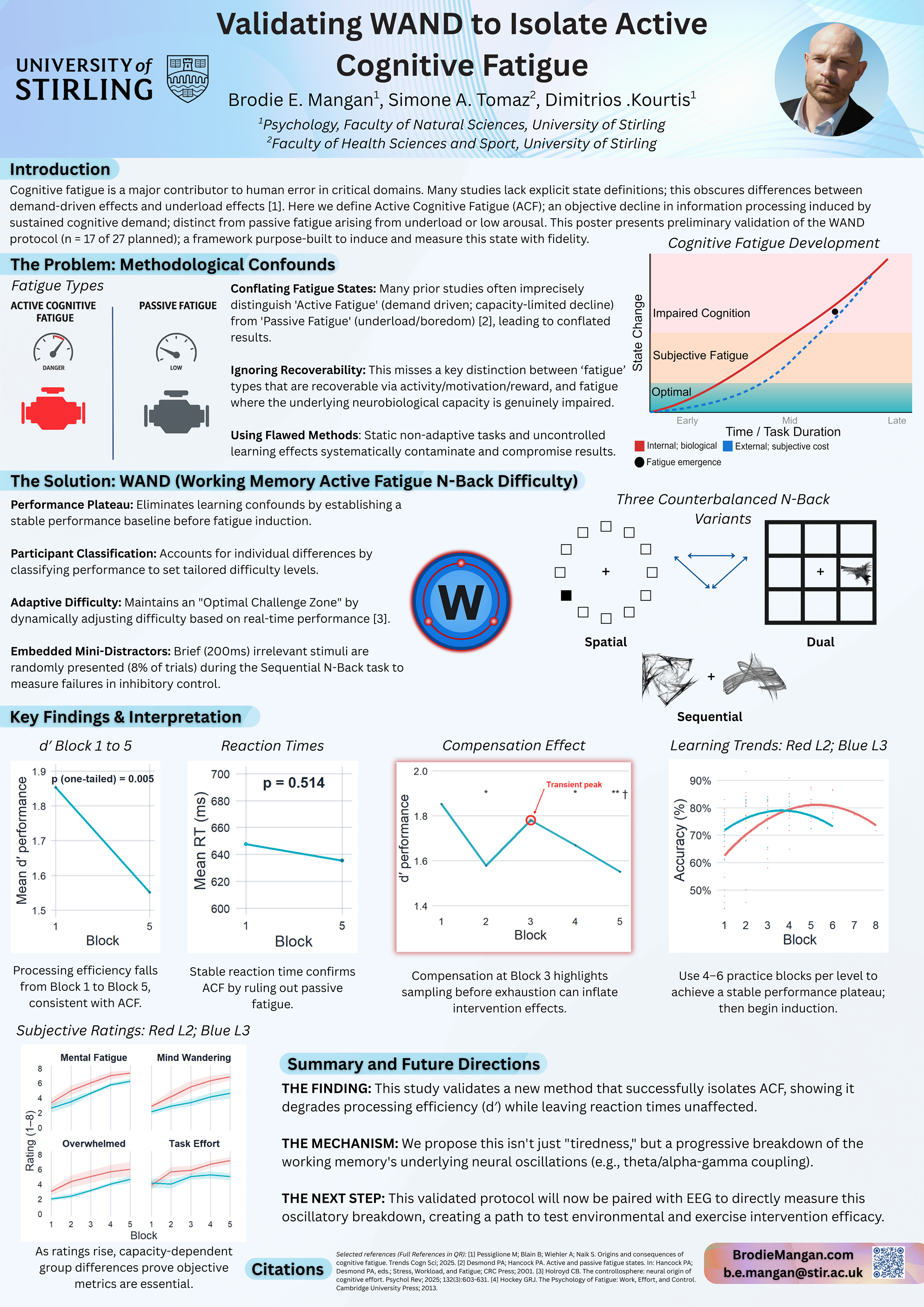
BACN 2025 Poster Prize Winner
I am honoured that this poster was awarded the poster prize at the British Association for Cognitive Neuroscience conference 2025. Thank you to everybody involved in the conference.
Poster Audio Walkthrough
Abstract
Cognitive fatigue research is hindered by methodological imprecision, where paradigms often confound genuine fatigue with task-learning or boredom. We developed the WAND (Working Memory Active Fatigue N-Back Difficulty) protocol to isolate Active Cognitive Fatigue (ACF) by systematically mitigating these issues. WAND uses a novel performance plateauing phase to control for intra-day learning effects, while adaptive difficulty and task variability prevent monotony. In our validation, working memory performance, measured by the sensitivity metric d-prime, declined significantly with a medium to large effect size. Crucially, reaction time remained unchanged, indicating a drop in processing efficiency characteristic of ACF, not passive slowing. This validated protocol now provides a robust foundation for future EEG research investigating the oscillatory mechanisms of cognitive effort.
Supplementary Material
Conceptual Confusion and the Necessity for Clear Definition
Research into cognitive fatigue faces substantial theoretical and methodological challenges due to imprecise conceptualisation (Goodman et al., 2025; Pessiglione et al., 2025). This lack of clarity has become so pronounced that some scholars have challenged the construct's scientific validity, comparing its variable operationalisation to 'The Emperor's New Clothes' (Pattyn et al., 2018). These issues stem from an inability to differentiate between mechanistically separate states, resulting in a body of research containing findings that are not merely inconsistent, but potentially erroneous.
To address this challenge, we introduce and define Active Cognitive Fatigue (ACF) as a condition resulting from prolonged, demanding cognitive activity, marked by measurable, objective deterioration in information processing efficiency. Establishing this clear, comprehensive definition represents a crucial step towards addressing the field's central methodological challenges:
- Confusion Between Fatigue Types: A fundamental issue involves mixing distinct forms of fatigue. The 'Active' designation in ACF indicates that this state emerges from sustained high cognitive yet moderately difficult demands, setting it apart from passive fatigue, which stems from insufficient stimulation and repetitive tasks (Desmond & Hancock, 2001). Contemporary researchers increasingly suggest "passive fatigue" may be better described as boredom or drowsiness (Mangin & Pageaux, 2025). The 'Cognitive' specification further restricts this state to objective information processing performance, differentiating it from subjective 'mental' experiences and from physical fatigue, which has distinct physiological mechanisms (Enoka & Duchateau, 2016).
- Problems with Fixed Protocols: Current approaches frequently overlook the dynamic relationship between individual capacity and task requirements. A task presenting appropriate challenge initially may become excessive as fatigue develops, creating a problematic blend of active fatigue and passive withdrawal (Hockey, 2013). Employing fixed protocols is therefore theoretically inappropriate for measuring the intended phenomenon.
- Opportunistic Task Choice: Paradigms are frequently selected based on convenience rather than theoretical appropriateness. This repurposing of existing tools risks generating outcomes that reflect statistical artefacts rather than genuine effects. Through adopting a clear, operational approach, we can begin addressing these methodological shortcomings and establish more solid foundations for cognitive fatigue research.
Key References
- Desmond, P. A., & Hancock, P. A. (2001). Active and passive fatigue states. In P. A. Hancock & P. A. Desmond (Eds.), Stress, workload, and fatigue (pp. 455–465). CRC Press. https://doi.org/10.1201/b12791-3.1
- Enoka, R. M., & Duchateau, J. (2016). Translating fatigue to human performance. Medicine & Science in Sports & Exercise, 48(11), 2228–2238. https://doi.org/10.1249/MSS.0000000000000929
- Goodman, S. P. J., et al. (2025). Approaches to inducing mental fatigue. Behavior Research Methods, 57, 102. https://doi.org/10.3758/s13428-025-02620-7
- Hockey, G. R. J. (2013). The psychology of fatigue: Work, effort and control. Cambridge University Press. https://doi.org/10.1017/CBO9781139015394
- Mangin, T., & Pageaux, B. (2025). It is time to stop using the terminology "passive" fatigue. Motivation Science, 11(1), 125–132. https://doi.org/10.1037/mot0000375
- Pattyn, N., Van Cutsem, J., Dessy, E., & Mairesse, O. (2018). Is "cognitive fatigue" a remake of "the emperor's new clothes"? Frontiers in Psychology, 9, 1246. https://doi.org/10.3389/fpsyg.2018.01246
- Pessiglione, M., Blain, B., Wiehler, A., & Naik, S. (2025). Origins and consequences of cognitive fatigue. Trends in Cognitive Sciences, 29(8), 730–749. https://doi.org/10.1016/j.tics.2025.02.005
